#original British folk music
Explore tagged Tumblr posts
Text
youtube
Mark Stevenson, singer, songwriter, poet, player of bodhrán and whistle, performs his own song 'Man of British Weather', live at The Plough in Worcester.
Perfect song for today in Britain!
#Man of British weather#Mark Stevenson#bodhrán#British folk music#original British folk music#Youtube
2 notes
·
View notes
Text
if you like this, i have two songs on spotify for you to check out!! :) search "4am smile"
#4am smile#acoustic#acoustic guitar#bedroom pop#british music#folk music#folk punk#indie#indie folk#new music#original music#anti folk#british#uk music#transgirl#transfem#trans musician#lgbtq#alt country#alternative#alternative music#singer songwriter#trans pride#young musician#indie artist#indie musician
2 notes
·
View notes
Text
youtube
Lyrics
I will let you know when I am there,
In the gentlest breeze, standing still,
To the quiet things we miss each day,
You are aging well, as far as I can tell,
The disaster was on time today
See I see the good in everything
I see the good in everything
I see the good in everything
I do.
I am drifting now but I don’t mind,
The things I used to love I’ve left behind,
But the memories are still fond,
So I palm them off to carry on,
So I will let you know when I am there,
In the gentlest breeze I’m standing still,
And the loungers sit and all agree,
Though I’m not poor I haven’t any money anymore,
And the thief didn’t thieve as much as he could have done,
See I see the good in everyone,
I see the good in everyone,
I see the good in everyone,
I meet.
#guitar#poem#Songs#folk#cottage core#english#folk music#rock#rock music#poetry#singer songwriter#poet#poems#art#spilled thoughts#music#indie music#british#original#words#acoustic guitar#alternative#acoustic#indie#new music#singer
2 notes
·
View notes
Text
I have thoughts on Jimin's SGMB
It's the gayest thing I've ever seen.
And by that I mean it's joyous, light-hearted, bright, and fun.
We can all agree, I think, that this is a happy and totally harmless song. Who could criticise Jimin for declaring his love in such a sweet and innocent way?
Of course not everyone will like it, and that's fine. You don't have to like everything he does - or everything BTS does - you are an individual with thoughts and feelings of your own - I hope. But putting that aside you'd have to be a troubled person indeed to take offence at anything here.
So, it is definitely a fan song, right? Jimin is singing to his fans... isn't he?
Maybe.
But if it is (I and I'm not convinced) it's not just a fan song.
It's sweet, so sweet, but....
Maybe it's a little too sweet?
We know Jimin is CUTIE SEXY LOVELY and LOVELY LOVELY LOVELY, but let's be honest, he's also a grown man. And Army are not children (mostly). In fact we have had many many conversations about how ARMY are not children.
But this whole production is pushing the sweet and innocent barrow so hard that I can't help wanting to look underneath and behind and inside to see what's really going on because it's so sweet it's hurting my teeth.
Compare the sophistication and self awareness of FACE to the bouncy, bright and child-like song-and-dance in the SGMB music video. They are WORLDS apart and we were told very specifically that the albums were linked.
"Following his first solo album, “FACE,” where he sought to explore his true identity, “MUSE” documents his journey in search of the source of his inspiration." said the Weverse notification.
So what's really going on here?
What are you doing Jiminie?
And more importantly, why are you doing it?
You could call it a pageant, or a carnival, or a circus - with Jimin as the ringmaster.
But my view is:
This a pantomime. And it's very clever.
According to the Oxford Dictionary, a pantomime is "A dramatic entertainment, originating in Roman mime, in which performers express meaning through gestures accompanied by music." Yes, that describes it.
Merriam-Webster tells us "[A pantomime] is an ancient Roman dramatic performance featuring a solo dancer and a narrative chorus" That also makes sense.
Oxford also specified that it's a modern BRITISH tradition. "a theatrical entertainment, mainly for children, which involves music, topical jokes, and slapstick comedy." It's a perfect fit.
The British link is already there - Jimin clearly told us he's influenced by The Beatles' Sergeant Peppers Album. There's also the styling of his suit. The stovepipe pants, narrow tie, and fitted jacket are very 1960s (and 1980s) British pop.
There's something old-school about a pantomime. It harks back to childhood, and to the nostalgia of holidays. And the styling of the MV is in keeping with that nostalgic feel too - from the Mountain scene with the vintage film title, to the intertitles - or title cards , to the circular frame of the opening scene.

But back to the Pantomime itself...
A quick google search told me the following are important elements of pantomime. And we have most, if not all of them in this production.
Gender role reversal - TICK
Slapstick comedy - TICK
Colourful costumes - TICK
Audience participation - TICK (the children ARE the audience)
Exaggerated facial expressions - TICK
Take another look at the music video - it's all there.
Wikipedia tells us that pantomimes traditional told fairy tales or folk tales - often love stories - and that the primary role in a Pantomime was:
The 'Principal boy', a hero or charismatic rogue, traditionally played by a young woman in men's clothing.
Smart, very smart. With all the other conversations we've been having a round gender this is totally on the money.
Wikipedia goes on to say "Another pantomime tradition is to engage celebrity guest stars... Contemporary pantomime productions are often adapted to allow the star to showcase their well-known act.... If the star enters into the spirit of the entertainment, he or she likely adds to its overall effect"
Welcome, Loco.
(yes, I know collabs are de rigueur, but that doesn't change the fact that it fits - celeb guests are an established practice in Panto.)
So if this IS a Pantomime (and I'm not saying it definitely is but it looks like one to me), then it's intended to be a sung-story, told as much through dance and gestures as through words.
If it's a pantomime, what is it about?
I'm glad you asked! This little charade is the story of a young person called Jimin who is looking for love. He finds romance easily enough...
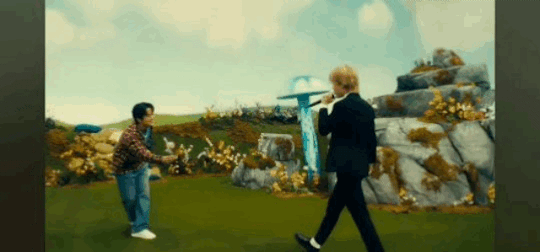
but real love takes a little longer.
Fortunately for our hero, he's brave (he will confess to his lover) and he is patient (he encourages them to do so too).
In between, there are shenanigans and goofing...

But our Charismatic Rogue is charming (if devilish) and wins the hearts of the audience - and his lover.
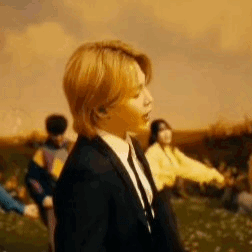
Let's take a closer look at how the story unfolds...
At the start of the MV, as the initial credits appear, Jimin is on stage vibing with his band. Loco is chilling on a rock like a lizard in the sun.
We get the ye olde intertitles, welcoming the audience and introducing.... SMERALDO Garden Marching Band
It's not Smeraldo Garden - Marching Band. It's Smeraldo *pause* Garden Marching Band. Smeraldo (secrets) has the emphasis.
After the intertitles, the scene opens on a group of children - they are ostensibly the audience of the band. They're playing paper-scissors-rock to see who will call for Jimin's attention.
The children run over to him and the tale begins.
Jimin, the main character of this story, immediately launches into song.
He starts off singing about Bangtan - mentioning their harmony (song and personal I think), he shows the Bangtan hand gesture we all know so well, and he sings "we gift happiness every day".
But he mentions June 12th.
Why June 12th?
Why not 13th, their debut day?
BECAUSE THIS IS NOT A SONG for ARMY. He's making it clear that at this point he's referring to Bangtan specifically, not the whole juggernaut of the fandom and fame. June 12th precedes ARMY.
He's made it clear from the start - this is NOT ABOUT ARMY.
Then he leans in and whispers to the children - and the camera -"lets talk about us".
Look at the kids' faces - they're miming shock. Ooooohhh! This is a big secret he's about to tell them - and us.
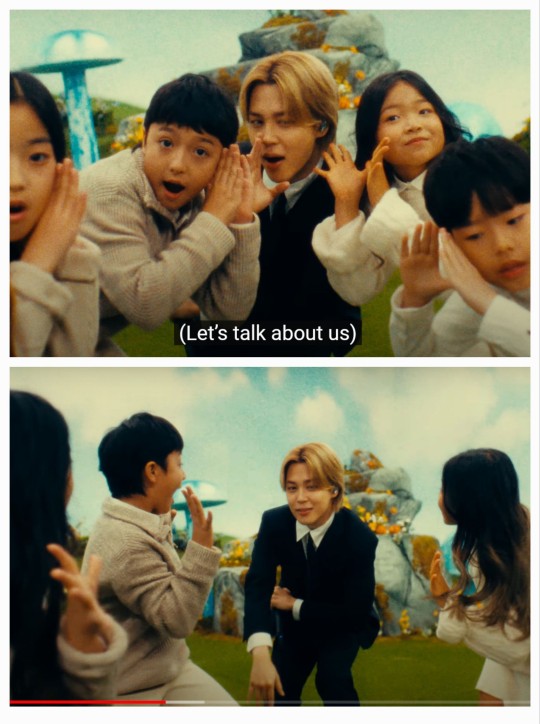
Look at Jimin's expression - he's just a tad smug. This is not a shocking secret to him, this is a fun secret.
Yes, he is indeed the charismatic rogue of this story.

He sings:
"All the things we couldn't say before
And your hidden feelings too (just for you)
Don't you worry anymore
Since we're together now**
Let's be a little more honest."
So it seems our main character has a LOVER. Someone who couldn't be revealed and who hid their feelings.
<Wow, I have no idea who this could be...>
Hang on, what's happening in the MV??
On his journey, it seems our young hero has a few short-lived romances. And if you look carefully, they are all with men.
He accepts the rose from a man, and plants himself on the bench right up close to .... a man. He jumps up unperturbed, and gifts the rose to (you guessed it) another man.
Jimin manages to sidestep (or completely ignore) all the women except one, who he sends graciously into the arms of a random man before continuing on his journey.
Wait one moment... his romantic partners were ALL MEN??
ALL MEN??
ALL MEN?!!!!!
Yes darling, all men. Let's continue.
So, it seems none of Jimin's previous romances grew into anything more, but he takes his own advice with his mysterious lover and confesses first.
He smirks. He flicks his jacket with pizzazz. He's ready.
He sings:
"Ooooh I love you babe,
I'll come closer to you
I want to hold your hand,
I want you babe (yessir)
Please note the hand gesture in this choreo - it's another one we've seen many times.
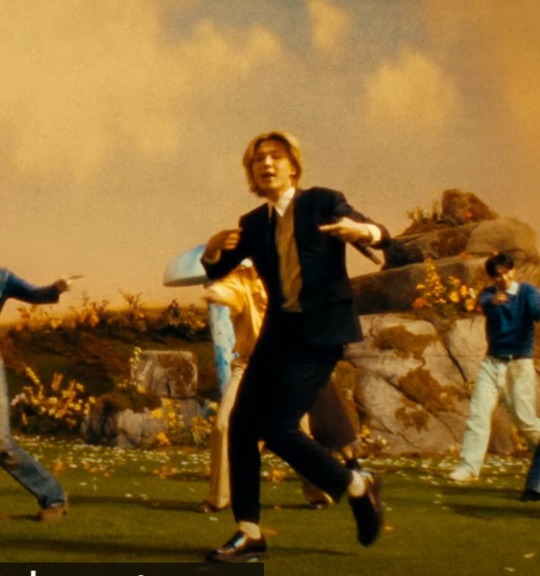
The dance ends and Jimin scans the surroundings and spots his old friend...
[Enter stage left: Loco]
Oh look, the friend is a rapper a few years older than Jimin. They seem to have a lot of fun together, Jimin and his rapper friend. There are ZERO romantic overtones here. This guy happily goes along with all the goofing and silliness even though he looks a tiny bit mortified. Either they are both very good actors, or a lot of the time, Loco was holding in his laughter. And Jimin seems incredibly amused by that.

They hang out together until.... something in the atmosphere changes:
The colours become richer, light become warmer, and oh look....
It's *The Golden Hour*
I AM NOT MAKING THIS UP, PEOPLE. HE REALLY DID THIS.
Jimin leaves Loco, chasing the golden light as he sings about "the dazzling sky." Golden confetti (champagne, anyone?) falls all around him and then ...
fucking sunflowers bloom.
SUN FLOWERS.
BLOOM.
FOR HIM.

<I need to lie down and process this>
SUNflowers...
Remind me again what sunflowers are known for? Oh yes, they are symbolic of the sun. Guess what else? They turn to face the sun.
Yup, the sunflowers all turn their faces toward the camera. I'm not crazy, okay?! I'm not.
SMH... let's move on.
Jimin re-joins his band, and the sunflowers do their sunflower thing, and Jimin sings:
"So tell me how you feel,
let whatever you feel
wash over you"
Then he sings
"I love you babe, (yessir)
I'll come closer to you
I want to hold your hand,
I want you babe (yessir)
Please note the hand gesture again
👉 👈
The bridge is next, and Jimin takes us back to Bangtan. As all the stars appear (that ocean of purple light that surrounds them at concerts) and everyone takes their place on stage, they turn up the music. <Are my eyes watering? Perhaps>
"I think we're ready now
<NGL I may have shed a tear here>
Lets begin 1, 2
<Ok fuck, I bawled at this point. Goddammit Jimin!>
Put your hands up"
*cute wiggle-dance commences* and Jimin spots his good friend the rapper again, hiding on the sidelines. He pulls him into the chorus line and they do more silliness and everyone is having a great time.
Confetti- flower petals fall, there's laughter and happiness all around, and they bow and bid us good bye.
The show is over.
*THE END*
But wait, I am not done.
A few more things bear mentioning here:
I saw quite a few comments saying this song is for ARMY.
It is categorically NOT for ARMY. Besides the fact that we already have Closer Than This - a fan song - on this album, Jimin specifically chose a date before debut - before ARMY existed - to place in this song. No mention of ARMY at all. Accept it graciously, this is not for you.
I wanna hold your hand
This lyric is a reference not only to the Beatles song "I Want to Hold Your Hand", It's also a common theme with Jimin and Jungkook. We see them finding any feeble excuse to hold hands, shake hands, touch hands. Yes, we see you two...
I am you, You are me
The gesture used in the choreo when Jimin is singing his confession - I failed miserably to catch it in my screengrab but there's no doubt it's their "I am you, You are me" gesture. Take a look for yourself.
All Jimin's romantic moments happened with men.
I'm not saying in his life, I am saying in this MV. All of them. The only interaction he has with a woman is one brief moment where he grabs her wrist as she passes by and he swings her into the path of a guy behind him. He even scoots around the women and sidesteps them. That can't be accidental. He's making a point.
The addition of 'yessir' in the lyrics makes it clear that he's confessing to a man.
I cannot see any reasonable way to refute this. The BH subtitles include it even though you have to listen carefully to catch it. THAT IS A CHOICE, NOT AN ACCIDENT.
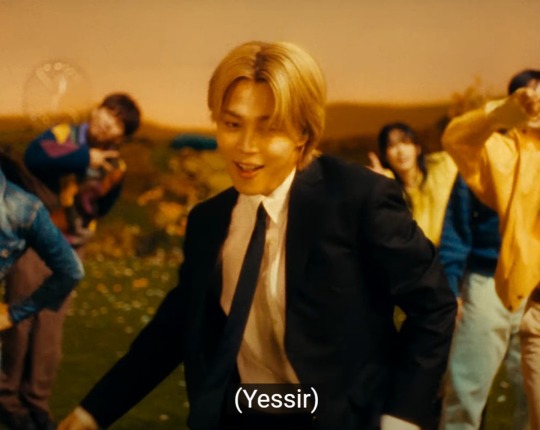
"Even though we're together now"
These lyrics could mean theyre an established, committed couple. But if we think a little broader than that, and a little more literally, who is he together with right now?
It's strategically brilliant.
This is his 'tell all expose' but he has built in a rock solid escape clause by using the panto format. Staging the whole love story - including the prior boyfriends and the man he's now in love with - as an over the top comedy show makes it easily dismissible as pure fiction. By including the fantasy/magical elements he just makes it more so. Deniers will be able to come up with a dozen reasons to reject this... 'It's a fantasy story', 'not all songs are autobiographical', 'he's making a point', 'he's raising LGBTQIA+ awareness'... all true maybe, but that doesn't change the fact that this is HIS song, about HIS muse. If you've been paying attention (and even if you haven't) you will know this is certainly not pure fiction.
AND FINALLY....
The most important one, I left till last. I actually want to scream this, in all caps, in the biggest font possible. But I will restrain myself.
The song is bookended by references to BTS.
That is hugely important. For those who may not be aware, this is a literary device. Bookending a story provides a start and end reference point. Here, the Bangtan bookends provide context for the rest of the lyrics - they frame the lyrics within them. That means the events happening in the song, happen within the context of Bangtan. Reading between the lines, the person he is singing to/about is within Bangtan.
This is not reaching. This is like mixing blue paint and yellow paint together. You will get green paint.
💛+💙=💚
So yes, this song is the gayest thing I've ever seen.
And I DO mean it's joyous, light-hearted, bright, and fun.
But yes, it's also absolutely and totally really really GAY
🏳️🌈🐥🦄🌈🏳️⚧️🌻🐰☀️🏳️🌈
Thank you Jiminie
#park jimin#jeon jungguk#jikook#kookmin#국민#true love#jungkook#bts jimin#jimin comeback#jimin sgmb#smeraldo garden marching band
510 notes
·
View notes
Text
Bulgarian Music in Studio Ghibli films
”Myth has it that Orpheus was born in what is now Bulgaria. It seemed to be fact, not myth, that his daughters are still singing there”
These words were written by the New York Times in the remote 1963 — the year in which the largest Bulgarian folk ensemble crossed the Iron Curtain to conquer an entire continent with its cosmic art.
The 1975 release of Le Mystère des Voix Bulgares, a compilation album of modern arrangements of Bulgarian folk songs, further popularized Bulgarian music, and in 1977, a vinyl record featuring the folk song “Izlel ye Delyo Haydutin” (Eng: Come out rebel Delyo) began its journey aboard the Voyager 1 and Voyager 2 spacecrafts.
From this point on popularity from the West spread to the East, and Bulgarian folk music made it to the entertainment industry, including legendary Japanese anime films, like the cult cyberpunk “Ghost in the Shell” or the heartwarming Studio Ghibli features.
In this short article I write about two occasions of Bulgarian music playing in Studio Ghibli’s films.
The record that inspired the creation of “Only Yesterday”
“Only Yesterday” is a 1991 Japanese animated drama film written and directed by Isao Takahata, based on the 1982 manga of the same title by Hotaru Okamoto and Yuko Tone. Set in rural Japan, the film draws parallels with the peasant lifestyle present in Eastern Europe.
The original work is a compilation of short stories about 11-year-old Taeko’s daily life in 1966. Director Takahata had a hard time making it into a movie since the manga, told in the form of a memoir, has no plot to hold a feature. Together with producer Toshio Suzuki, they came up with the solution of bringing the narrator of the story, adult Taeko, into the movie. But there is a curious anecdote about how this idea came to mind.
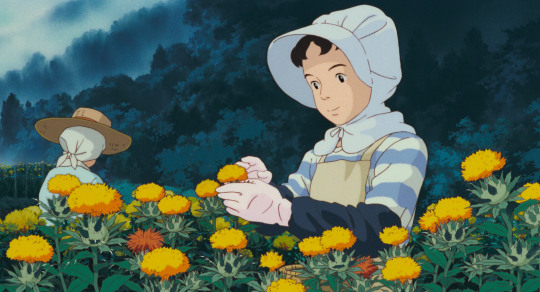
Taeko picks safflower as the Bulgarian song “Malka moma dvori mete” plays in the background. © Studio Ghibli
In a 2021 interview with students from Sofia University St. Kliment Ohridski, producer Suzuki recounts how a record of Bulgarian songs performed by the children choir “Bodra Smyana”, introduced to him by director Takahata, inspired the creation of the movie. Moved by the cosmic voices of the children, they decided to make “Only Yesterday” a musical. He also recalls what a tiring process it was to acquire the rights to the music, but if you’ve seen the movie, I am sure you will agree that it was worth it; the haunting, beautiful songs with the pastoral images of farmers picking flowers contribute to one of the greatest scenes created in cinema.

Producer Suzuki showing the record that inspired the creation of ”Only Yesterday”. Source: Studio Ghibli’s Twitter
In “Only Yesterday”, we can hear two songs from the album Bulgarian Polyphony I by Philip Koutev Ensemble. The upbeat “Dilmano Dilbero” [Eng. beautiful Dilmana] sets a happy mood as the protagonist gets changed and ready to go on the field. As the scene shifts and Taeko starts narrating a sad story about the girls in the past picking safflower with their bare hands, the song and mood shift as well.
While the first song has a fast rhythm, with lyrics about pepper planting that can also be interpreted figuratively, the second one, “Malka Moma Dvori Mete” [Eng., a little girl sweeps the yard], is a ballad about a young girl who is forced into marriage but has never known true love.
Both compositions sing about life-cycle events like marriage and the regular coming of the harvests, with lyrics perfectly fitting the setting and plot of the movie, which makes me wonder if the filmmakers chose them by chance or if they had someone translate the words.
Bulgarian Cosmic Voices Enchanting Howl
“Howl’s Moving Castle” is a 2004 Japanese animated fantasy film written and directed by Hayao Miyazaki, loosely based on the 1986 novel of the same name by British author Diana Wynne Jones. Set in a fictional kingdom the movie draws inspiration from various places in Europe. One of them being Bulgaria.
The story focuses on a young girl, named Sophie, magically transformed into an old woman, and a self-confident but emotionally unstable young wizard, Howl, living in a magical moving castle.
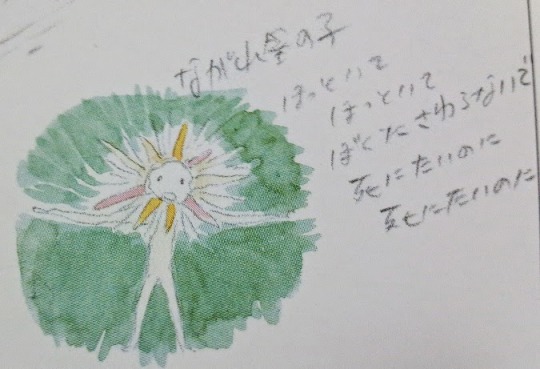
A sketch of a Star Child. Source: The Art of Howl’s Moving Castle
If you’ve seen the movie, you surely remember the scene when Madame Suliman ambushes Howl and tries to strip him of his magic powers. Star Children encircle him and his companions; their shadows grow big, dark and intimidating. They start dancing and chanting unintelligible magic words and are almost successful in their devilish act.
This scene, together with the music played in the background, have been a favourite of many fans of the film. Some even recount it giving them nightmares when they were children.
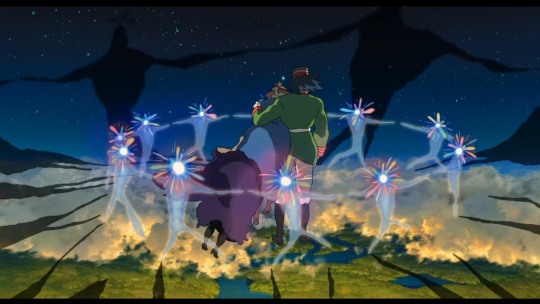
Star Children encircle Howl in an attempt to strip him of his magic powers. © Studio Ghibli
It turns out, however, that these aren’t any incantations, but the lyrics of a folk song. In Bulgarian. And a love song! Contrary to popular belief, the lyrics have nothing to do with magic and are actually about a boy taking his sweetheart, Dona, to the market to buy her new clothes. The excerpt used in the movie is very short and a bit altered from the original, but the words used go like this: Trendafilcheto, kalafercheto, Done mamino, translated as “the rose, the costmary, my darling Dona”.
I am planing a follow up article where I will post the translated lyrics together with a brief explanation on how they are related to the movies.
If you want to comment on or add something, I would love to hear!
Source
#studio ghibli#only yesterday#howls moving castle#Le Mystère des Voix Bulgares#bulgarian folklore#bulgaria#toshio suzuki#hayao miyazaki#isao takahata#bulgarian music in ghibli films#the boy and the heron#スタジオジブリ#ブルガリア#おもひでぽろぽろ#ハウルの動く城#宮崎駿#高畑勲#鈴木敏夫#bulgarian music
681 notes
·
View notes
Text
Unknown asteroids #2

@m1nd-r0t here is part 2, enjoyyy!!
🌷Elodie (10726) – French form of Elodia, which has a Spanish origin; means “foreign riches” as in old money/inheritances, denoting the nature of both Capricorn and Scorpio; if prominent in composite, it can indicate a couple that becomes rich together under mysterious circumstances
🌷Epicles (23549) – of Greek origin; denotes an Ancient Greek medical writer who lived in 1st or 2nd century BC; prominent in medical staff and medicine students
🌷Epimetheus (1810) – of Greek origin; denotes the Titan god of afterthought and excuses; it shows which area we tend to come up with excuses (if it aspects Mars – excuses as to why we can’t start something, why we don't exercise; if it aspects Venus – excuses as to why we can’t get in a relationship, why we’re unlovable)
🌷Epikourus (5954) – of Greek origin; denotes an Ancient Greek philosopher, who founded a renowned philosophy school centered around Epicureanism; prominent in philosophers and those who think deeply
🌷Ercol (155784) – of British orign; denotes a British furniture manufacture; prominent in the charts of successful interior designers, usually by sextile or trine
🌷Fado (541741) – of Portugese origin; denotes a type of Portugese folk music which centers around death, mourning and loss; based on my research, it does show up in the charts of metalheads who are into doom metal (this asteroid usually aspects their moon), but not in the charts of goths
🌷FAIR (204873) – of English origin; well, it’s self-explanatory
🌷Fairbank (67235) – of English origin; denotes someone who gets charity money for the right cause/someone who easily attracts scolarships and sponsorships
🌷Fiammetta (50729) – of Italian origin; means “little fiery one”; denotes someone who becomes cute when angry; in the charts of very spiritual/religious people, it can show the faith that burns inside and guides them
🌷Huma (3988) – of Persian origin; denotes a bird similar to the phoenix, which is supposed to bring luck and fortune; luck that comes after a transformation
🌷Hus (1840) – of Swedish origin; means house; in synastry, if there’s double whammy aspects (person A’s Hus aspects person B’s Hus and vice versa), it’s very possible that you might live together
🌷Icke (7508) – of (old) Swedish origin; means nobody, no one; if it conjuncts Sun, it indicates a loner or someone who isn’t taken into consideration by others; a second meaning: what we find disgusting
🌷Ida (243) – of Greek and German origins; means industrious, laborious, hardworking
🌷Indulgentia (90703) – of Latin origin; means lenience, concession; in synastry, it denotes someone prone to give a second chance to their ex; if this asteroid squares the other person’s Venus and the Venus person cheats on the Indulgentia asteroid person, the asteroid person is very likely to forgive them and continue the relationship
🌷Isolda (211) – of Welsh and German origin; means “she who is gazed at”; denotes a woman who attracts the attention of both men and women due to her beauty; if it conjuncts MC, it can point out to a career as a model
🌷Jaffe (9696) – of Hebrew origin; means beautiful, pleasant
🌷Jamila (1843) – of Arabic origin; same meaning as asteroid Jaffe
🌷Lioba (974) – of German origin; means dear, beloved one
🌷Lippens (9640) – of Scottish origin; means trust, to rely on someone; a second meaning: lips
🌷Lipschutz (2641) – of German origin; means lip protection (it might be prominent in those who use lip balm frequently); in synastry, it denotes a thoughtful, caring lover, who kisses softly
🌷Meesters (10647) – of Dutch origin, means master (of something), boss
🌷Megaira (464) – of Greek origin; she is one of the 3 Furies/Erinyes in Greek mythology; denotes jealousy and envy, similar to Klythia (73) and Irsha (216451)
🌷Meiden (2881) – of German origin; mean to avoid, to shun
🌷Vieuxtemps (40007) – of French origin; means “old times”, but it can also show nostalgia; in synastry, it can show connections that last decades; the friends and lover/spouse we will have during seniorhood
🌷Vetter (18377) – of German origin; means cousin
(10726, 23549, 1810, 5954, 155784, 541741, 204873, 67235, 50729, 3988, 1840, 7508, 243, 90703, 211, 9696, 1843, 974, 9640, 2641, 10647, 464, 2881, 40007, 18377)

#astro#astro community#astrology#astro placements#astro observations#astro posts#astroblr#astro blog#astro notes#asteroids
342 notes
·
View notes
Text
Did you know that Audrey Hepburn danced two traditional Catalan songs?
It happened in the 1952 movie Secret People. The movie's music was composed by Robert Gerhard, a composer born in 1896 in Valls, Catalonia. He grew up in Catalonia and studied music in different parts of Europe, becoming a well-known composer and adviser to the Minister of Fine Arts of Catalonia's Government during the Republic. However, his life was struck with the defeat in the Spanish Civil War (1936-1939). Like tens of thousands of Catalans more, his family had to go on exile after the fascists' victory in the war.
Until the death of the Spanish fascist dictator Franco (1975), after Robert Gerhard's own death in 1970, his music was not played in Spain and his motherland Catalonia. Meanwhile, he had become a very respected composer in the UK, France, the USA and other countries, and was awarded with prizes including being declared Doctor Honoris Causa by the University of Cambridge and the title of Commander of the Order of the British Empire (a knighthood given by the British Monarchy to people who have contributed to society).
He always stayed close to his Catalan roots and composed Catalan music genres like sardana and spoke about his Catalan identity. In this clip of the movie Secret People, Audrey Hepburn dances to a song made of two traditional Catalan folk songs: El cant dels ocells and La mare de Déu quan era xiqueta. Here's the clip:
Here you can hear the original songs:
El cant dels ocells ("The Song of the Birds"):
youtube
La mare de Déu quan era xiqueta ("When Mary was a young girl"):
youtube
Can you recognise the melodies in the movie clip?
#música#arts#història#robert gerhard#valls#catalunya#audrey hepburn#diaspora#usa#other countries#world music#folk music#history#music history#guerra civil#secret people#classic hollywood#1950s hollywood#1950s movies#1950s
40 notes
·
View notes
Note
Genuine question! I don't mean this rude but does the US have folk songs? I just didn't know since it was such a newer country.
Yes. I'm pretty sure every country has folk music regardless of the newness of their country. You'll notice a lot of them have heavy Irish influences for obvious reasons. But yes this would considered 'cowboy music' songs they would sing whilst around a fire. Think Red Dead. Those are all real songs too. Here are a few but there are honestly hundreds.
youtube
This one has BIIIIIIG Irish Energy. Also It sounds best if you sing it in an Irish accent like these guys are. Because that's honestly most likely what it was like.
youtube
youtube
youtube
youtube
So this song. Not a lot of people know the origins or what the words really mean. This song was original The jig of the British Army and the Brits started calling the Americans Yankees, as we know. Then the Americans stole the song. So the line, "Stuck a feather in his cap and called it Maccaroni" Maccaroni was 1700's slang for 'cool' so if something was Macaroni it was rad as hell. So the Brits were mocking the Americans for putting feathers in their hats saying "You guys thing you look so cool but you actually just look dumb. Also you're always fucking all the time. You're poor. Your guns are old. So ha!"
So when the Americans started to win the war and push the Brits back the Americans started to sing the song back to the Brits giving it a whole new meaning. Which was once a diss track became a double diss track. It turned it into "You're right we do actually look sick as hell with our feathers in our hats thanks for noticing." And so on. Americans are so unserious, always have been.
Prussia & America when the Brits dropped this song. Brittan really popped off with this one not gonna lie. Still slaps unironically.

I would also like to note that Americans Also have Sea Shanties.
youtube
About the American-Mexico war. This song goes so hard.
youtube
First recording was a whaling ship that was leaving New London, Connecticut. Again, it's sang best with an Irish accent because that is most likely as it was preformed. It's also sang to the tune of an existing Irish folk song.
These are two I know off the top of my head. I'm sure there are many more.
28 notes
·
View notes
Text
David Duchovny: ‘The X-Files took up my life, but it was a miracle’
It's behind a paywall so if somebody has access I would love to read the article
Update : got it, thanks @aimsies-mctaymellburg
David Duchovny: ‘The X-Files took up my life, but it was a miracle’
As Fox Mulder in the hit sci-fi show, the actor and singer peddled fringe conspiracy theories. Now the 63-year-old says Mulder’s paranoia is everywhere.
In hindsight it wasn’t a great idea for me to kick off an interview with David Duchovny by suggesting that he was a musical dilettante. You’re most likely to know Duchovny, of course, as Fox Mulder, the conspiracy-theory-guzzling FBI agent in The X Files, one of the biggest shows of the Nineties, watched at its peak by 30 million in America alone. Perhaps you saw him as the womanising writer Hank Moody in Californication or the 1960s detective Sam Hodiak in Aquarius. You may even have read some of his five books.
Duchovny, a New Yorker living in Los Angeles, is less known for music, although he’s been making rather decent folk-rock for a decade — songwriting, playing guitar and singing in a honeyed drawl. His 2015 songHell or Highwater has been streamed more than a million times while Layin’ on the Tracks, from 2020, has pointed lyrics about a certain politician (“It’s a killing joke that no one laughs at/ A stupid orange man in a cheap red hat”). He has released three albums, with a fourth due next year, and this month plays Latitude festival in Suffolk and the 2,000-capacity Shepherds Bush Empire in London.
So does the 63-year-old feel that he should no longer be seen as just a musical dabbler? “That’s part of a lazy person’s perception,” he says, bristling slightly. “It’s a lens through which people want to see me. I think music is an innocent art form — you listen to it and you have a response. To bring any kind of baggage to bear on it in the beginning seems to me to be dishonest, but that’s the way things go.”
YouTube clips of recent shows suggest people were having a lovely time, I say. This doesn’t have the soothing effect intended. YouTube footage lingers “because of the horror of the cell phone”, Duchovny says. “It’s a pet peeve of mine.” Is he tempted to ban them at his shows, as artists from Prince to Bob Dylan have? “I don’t know that I can enforce that view on anybody.”
For Duchovny, it’s as much about phones limiting his performance as it is about the audience not living in the moment. “To do something unique or for the first time, to reach for a note or play a different melody — all these are chances you might take if you weren’t inhibited by the fact that somebody is [recording] it,” he says. “You’ve got to be able to fail and the ubiquity of cell phones makes failure scarier than it needs to be.”
Failure is the key to another of his jobs: podcasting. In his series Fail Better, he adroitly interviews guests including Bette Midler, Ben Stiller and Sean Penn about their failures. “I feel like I’ve been failing my entire life,” Duchovny said on launching it in May. That may sound strange from a man with English degrees from Princeton and Yale, who has won a Golden Globe for The X Files and another for Californication.
Is he familiar with Elizabeth Day, the British journalist who has hosted a successful podcast called How to Fail since 2018? When Duchovny announced Fail Better, Day tweeted: “I might invite David Duchovny on @howtofail to discuss his failure to be original.”
“This is the first I’ve heard of it,” he says. “If she wants to be rigorous in her thinking, she would investigate what my approach to failure is. I don’t know what her approach to it is. My sense, since failure is universal, is that there’s room out there for more than one discussion.” This is a rather po-faced response to what seemed like a playful comment from Day, and surprising because Duchovny has a wicked sense of humour. He can also afford to be more magnanimous, given that his podcast is at No 12 in the UK chart and hers is at 54.
Gillian Anderson, his X Files co-star, certainly likes his podcast, writing this week on Instagram that she had listened to all of the episodes and found them “intimate and vulnerable … very smart questions, although I wouldn’t expect anything else from you [David]”.
“It’s very sweet,” Duchovny says. “I will email her and thank her. I’m sure somebody running my social media is … I don’t really like to be on social media.” Later that day his Instagram account replies to Anderson’s post: “Thank you for listening, you have an open invite [to appear on his podcast]!”
That encounter would be worth hearing because his relationship with Anderson is fascinating. Despite their chemistry in The X Files there were rumours of friction — although they looked to be getting on swimmingly when they appeared on Jimmy Kimmel’s talk show in 2016 to publicise the return of the show, which ran for two more seasons.
When asked by Kimmel about frostiness between her and Duchovny in the Nineties, Anderson collapsed into giggles, laid her head in Duchovny’s lap and put any froideur down to the dampness of Vancouver, where the series was shot. Her hair kept going frizzy, she explained, and “for every single take we’d have to stand there and blow dry my hair again”.
“And I got pissed at that?” Duchovny asked.
“Well, I think it added to the tension,” Anderson said.
“It kinda makes me sound like an asshole,” Duchovny replied.
Anderson had nothing to do with him leaving The X Files in 2002, he says now. “That was just me wanting to have a family, but also to try other things. It had kind of taken up my life. There was no animosity with the actual show and the people that I worked with. I am proud of the show — it was culturally central in a way that it’s very hard to do these days in a fragmented landscape. There’s so many lightning-strike aspects to it that I can’t help but think of it as some kind of a miracle.”
The X Files gave conspiracy theories a kind of nobility — “the truth is out there”, as its tagline ran. Now they are more widespread and pernicious. “Mulder’s way of looking at the world was through conspiracy and that was the fringe at that point,” Duchovny says. “It doesn’t seem to be so fringe any more. It’s really the world that [The X Files creator] Chris Carter foresaw happening almost 30 years ago. He’s almost clairvoyant in that case.” Is Duchovny more evidence-based than Mulder? “Not at all. I’m an artist — I am associative-based and I see poetry as science and science as poetry.” So are there some conspiracy theories that he buys into? “No, I’m talking about art. I think conspiracies are mostly just lazy thinking.”
One failure that has shaped Duchovny is that of his marriage to the actress Téa Leoni, who starred in Bad Boys and Deep Impact. They married in 1997 and have a daughter, West, 25, and a son, Kyd, 22, but divorced in 2014. “That darkness does deepen you. It makes you more empathetic and humble,” Duchovny says. One of the themes of his podcast is “the difference between humiliating and humbling. Often we focus on humiliation in our culture. I don’t see any positives coming from humiliation, but I see a lot of them coming from humility.”
One wonders if the reference to humiliation has something to do with Duchovny checking into rehab for sex addiction in 2008. Could him playing the bed-hopping Hank in Californication be a case of art imitating life? “People never tire of trying to figure that out,” he says with a sigh. “But to me, that’s not what acting is about. I don’t look for things that are mirroring my life in any way.”
Well, there are parallels in Reverse the Curse, the 2023 film that Duchovny directed, starred in and adapted from his book Bucky F***ing Dent. He plays a would-be novelist who has “sacrificed his artistic dream to put food on the table”. His father, a publicist, did the same, publishing his debut at 75, the year before he died. The film has some really funny scenes, including one where Marty and his son have a farting competition in a motel room that ends up smelling like “an aquarium that fed a sock”. That may have come from a line in Aquarius where someone says something similar about a police station. “I might have ripped it off, I’m not sure,” Duchovny says. “ You can ask Elizabeth Day about that.”
David Duchovny will perform at Latitude festival, near Southwold on July 25 and 02 Shepherd’s Bush Empire, W12 on July 27
35 notes
·
View notes
Text
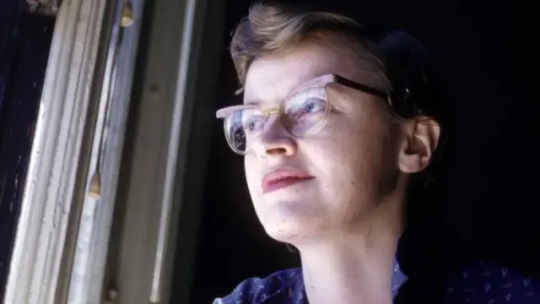
Connie Converse: The 'Genius' of a Singer Who Was Ahead of Her Time - Then Disappeared
Connie Converse failed to find fame as a singer-songwriter in the 1950s, then mysteriously disappeared without a trace. On the 100th anniversary of her birth - and approaching the 50th anniversary of her disappearance - she's now remembered as a great lost talent.
In January 1961, an unknown Bob Dylan arrived in Greenwich Village with a guitar in his hand and $12 in his pocket, on his way to revolutionising popular music with his poetic, personal songs.
Maybe he brushed past Connie Converse as she went the other way. She moved out of the New York neighbourhood that same month, after a decade of struggling to get significant attention for her own intimate, sophisticated and beautiful songs.
There is a parallel universe where Converse was the one who got the big break, and she is a household name.
At least, that’s the theory put forward in a recent book called How To Become Famous – not a manual, but about why some talented people become successful and others stay in the shadows.
It imagines a world where Converse is "widely known" as "the most original, and perhaps the greatest, of the folk singers of the 1950s and 1960s", who influenced everyone from Dylan to Taylor Swift, and for whom "a Nobel Prize is not out of the question".
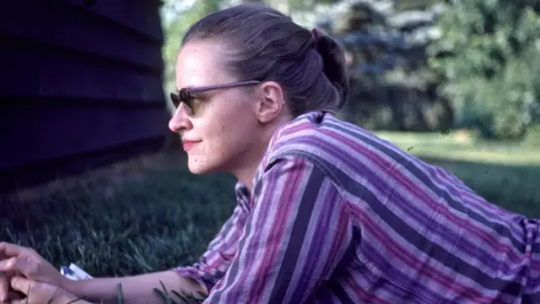
Musician and author Howard Fishman, who published Converse’s biography, To Anyone Who Ever Asks, last year, also thinks Converse could have made it big.
"I love to think about an alternate reality in which Connie Converse’s music did receive the recognition it deserved in its own time, and she became a recognised for the musical genius that she was," he says.
"I almost think a better version of American cultural history could have happened, had that been the case."
But How To Become Famous author Cass Sunstein concedes that Converse wasn't better than Dylan. She also faced barriers because she was a woman. And perhaps her clever, melodic and mostly melancholic songs just never quite had mass appeal.
They dealt with subjects like loneliness, promiscuity, quarrelling lovers, and frequenting saloons in the afternoons. It's certainly hard to imagine them really catching on in the early 50s, an age dominated by schmaltzy crooners, folk purists and show tunes.
"She didn't sound like anybody else that was making music in her own day," says Fishman. "And she doesn't sound like anybody else making music now, to my ears."
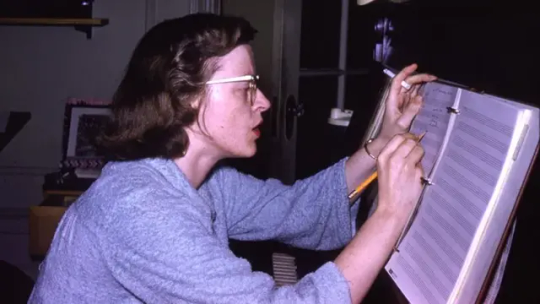
British singer Vashti Bunyan became a Connie Converse convert after a recommendation from US DJ David Garland, the first person to play her songs in 2004.
"I couldn't believe that they were [recorded] so long ago, it was the 1950s," Bunyan says. "And just to hear her speaking in a way that I would have always wanted to speak was very moving.
"She was completely ahead of her time, and it must have been very hard for her. She must have felt isolated.
"If she had any ambition for her songs, she must have known how good they were, how clever and funny and wonderful they were, and poetic. But other people didn't seem to recognise that kind of genius writing at the time."

Bunyan knows what it's like to have her music "rediscovered" decades later. She released an album in 1970, which has gained cult status in more recent years. She says their stories are very different, but agrees there is an allure to the idea of "the discovery of something from so long ago".
"And how lucky that she was recorded," she says. "Connie was recorded by her friends, and none of those recordings were supposed to be commercially released.
"But it's so wonderful that they have been, that they have been found. And it makes you wonder about all the other people that weren't."
Converse was recorded at the home of one of her friends and champions, Gene Deitch, but she never released any music in her time. She performed for small groups of supporters, but never played a proper concert. She made one TV appearance, but that led nowhere.
Ellen Stekert, a folk historian who was also performing in the 1950s, believes Converse was just "too different" to have "made it".
"I think she was wonderful. I think she was totally out of sequence of any kind of cultural impulse," she says.
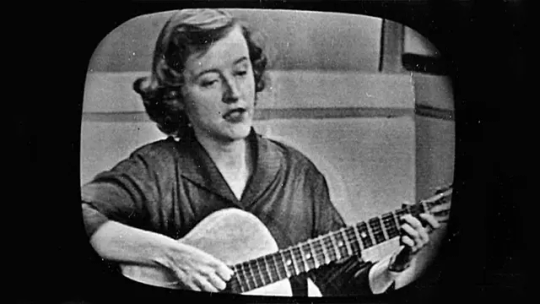
"She was self-contained, and also self-isolated. It was too bad somebody could not break through that."
Converse did have her supporters, but any female singer at that time needed to be backed by a man with the right connections, Stekert says. And Converse was socially awkward, and not good at self-promotion.
"Unfortunately, she didn't have much social understanding of things. She did not have a very good rapport, I think, with people.
"Evidently, she had very bad teeth and her body odour also was fairly prominent. And those are two factors in middle-class America that will make sure you don't make it any place."
Converse worked for a printing company and then for the Institute of Pacific Relations. After leaving New York in 1961, she became editor of the Journal for Conflict Resolution in Michigan, and her intellectual activities, and peace and anti-racism activism, were highly regarded.
But then, her life seemed to lose purpose and direction. On 10 August 1974, a week after her 50th birthday, she posted letters to family and friends, telling some she was returning to New York.
She drove out of Ann Arbor and has not been heard from since. Neither her body nor her car was found.

A new life?
"As far as we know, she never made it to New York," Fishman says.
"As far as we know, she never made it anywhere.
"I'd love to think that she started a new life somewhere else, and that she lived more years. But who knows?"
On Saturday 3 August, exactly 100 years after Converse’s birth, Fishman is in her home town - Concord, New Hampshire - for a ceremony to give the singer her first official recognition.
Her music has gradually spread over the past 20 years. So, too, has her story, and the mystery of her disappearance is often the first thing that gets people's attention.
"The unfortunate and darkly poetic thing is that she needed to disappear in order for us to see her," Fishman says. "That was the hook that was needed for us to pay attention to her.
"But what I always say is, don't focus on how she disappeared, focus on how she lived, because her life is so much more fascinating and meaningful, and has so much more to teach us than the fact that at age 50, she felt that she had to vanish."
By Ian Youngs.
#Connie Converse#Connie Converse: The 'Genius' of a Singer Who Was Ahead of Her Time - Then Disappeared#American singer-songwriter and musician#folk music#folk singer#music#musician#How Sad How Lovely#long post#long reads
24 notes
·
View notes
Photo

Gustav Holst
Gustav Holst (1874-1934) was a British composer of Swedish origin most famous for his dramatic orchestral suite The Planets, first performed in public in 1919. Holst also composed several operas, wrote sacred choral works such as The Hymn of Jesus, and was a dedicated collector of folk songs.
Early Life
Gustav Holst was born in Cheltenham on 21 September 1874, where his parents, who were of Swedish descent, had set up home. Gustav's father was an organist and piano teacher in Cheltenham. Gustav continued the family interest in music, learning piano and also conducting the local choir. His musical talent shone through, and in 1895, Gustav won a scholarship to study at the Royal College of Music in London. The Holst family had only modest means, and the scholarship – won at the second attempt – was a necessity for Gustav to widen his music education. He studied to play the trombone, an instrument he would use to eke out a living, teaching others to play the instrument and performing as part of seaside brass bands and as a member of the orchestra at the Carl Rosa Opera in London.
After graduation, Holst became a general music teacher in London. In 1903, Holst moved to Dulwich where he taught music at a girls' school, a position he would hold until 1920. In 1905, Holst also became the director of music at the St. Paul's School for Music in Hammersmith. Holst was certainly dedicated to teaching; he remained at St. Paul's for the rest of his life, but other teaching positions he held simultaneously included the music directorship at Morley College for Working Men and Women in London (1907-24) and a professorship of music at Reading University. In addition, Holst found time to return and teach composition at the Royal College of Music.
Continue reading...
36 notes
·
View notes
Text
Songs characters sing in the Alien movies:
1 - "The Man Who Broke the Bank at Monte Carlo" - a British music hall song from 1891 which David sings as he cuts his hair in Covenant. David is imitating his hero Lawrence of Arabia, who sang this song in a desert canyon to hear the echoes. This would have been a contemporary song for WWI-era Lawrence, but a leap for the 22nd-century David.
It is an ironic song in both cases, as it's about a glamorous gambler surrounded by money and women, while its singers are surrounded by desolation and death. While Lawrence comes across as playful (at that point in his arc), David appears sinister (likening the humans who have fallen for his trap to a windfall at a casino) or deluded (Walter finds flaws in David's knowledge later in the movie).
2 - "You Are My Lucky Star" - a Freed-Brown 30s number whimpered by Ripley as she prepares to airlock the xenomorph in Alien. The song was originally written for something called "Broadway Melody of 1936," but it is far more famous as one of the recycled songs for Singin' in the Rain. For Ripley, it is more of a mantra or prayer than a song, as she can only eek out the one line over and over. In this context, the romantic sentiment is completely lost, but the outer space reference is heightened.
3 - "In the Year 2525 (Exordium & Terminus)" - a 1969 psychedelic/folk rock song by one-hit-wonder Zager and Evans, which is sung by the prisoner Murph as he cleans an airduct before he is killed by the dog-xenomorph in Alien³.
It's a fun, grim song, and the only one of the three which is appropriate for the occasion, as it's about a science-fictional-turned-religious post-apocalypse, which is exactly what Alien³ is. Murph's lyrics are about the part where God returns to Earth and has to decide if the population is still human enough to warrant a Judgment Day.
I especially like the song as a criticism of the Bishop character, who was introduced in Aliens as an unbelievably benevolent Weyland-Yutani-made robot. The song suggests that even "good" robots could lead to our doom, since we lose ourselves as we lose our needs.
#alien franchise#david 8#lawrence of arabia#ellen ripley#singin in the rain#alien 3#in the year 2525
11 notes
·
View notes
Text

HAPPY BIRTHDAY TO PETER NOONE, the great singer/actor/musician and front man for the uber-successful British Invasion pop band, Herman’s Hermits. Their run included 3 feature films, countless TV appearances, tours with The Beatles and The Who, and 60 million records sold, with songs written by Sam Cooke, Ray Davies, Goffin-King, and Graham Gouldman. Originally from Manchester, Peter was 12 years old when he entered showbiz. Davy Jones (also from Manchester) told me that when Peter was a “teen idol” on magazines he still had to take the trash out as he was still living at home with his folks. Beyond the 60s, Peter kept on making records, intersecting with Bruce Johnston (Beach Boys), Tom Petty, Phil Seymour, and David Bowie—who produced and played on Peter’s cover of “Oh You Pretty Things.” I also recommend The Tremblers, Peter’s New Wave rock band from 1979. Meanwhile, Peter is still on the trail with the current Hermits line-up, crooning “Mrs. Brown,” “There’s a Kind of Hush” and his other hits. I crossed paths with Peter on the road many times, and I admire the way he avails himself to his fans. Meanwhile, here’s “Today’s the Day,” a Peter Noone/DavyJones collaboration from 1998. HB PN and thank you for the years of musical joy you’ve given to us.
youtube
#peternoone #hermanshermits #thetremblers #raydavies #grahamgouldman #manchester #davyjones #monkees #brucejohnston #beachboys #tompetty #philseymour #davidbowie #prettythings #seanmcguire #phillipthornalley
#johnny j blair#music#pop rock#davy jones#monkees#Peter Noone#Herman's Hermits#Tremblers#Ray Davies#Graham Gouldman#Manchester#Bruce Johnston#Beach Boys#Tom Petter#David Bowie#Sean McGuire#Youtube
9 notes
·
View notes
Text
Hob Gadling traditional folk music collection.
Been thinking about a sort of Hob Gadling character playlist composed entirely of British folk music. Songs he might have listened to throughout his life and resonated with. This is also just a little excuse for me to share some of my favorite folk songs from across the history of the British Isles :) Most of these are British in origin, but a couple are Scottish.
Some of these choices are loosely based on the fic And In The Waking World We Want And Wait by @qqueenofhades because at this point it's basically canon to me and has considerably influenced my perception of the character. Furthermore, I'm writing this with Dreamling in mind because... Well because I want to.
I'm attaching recordings for each piece, but keep in mind that, by the nature of folk music, songs (both melody and lyrics, as well as accompaniment and performance choices) are intrinsically altered in every performance and there is no single correct interpretation of a piece. If you don't like the recordings I picked, I encourage you to seek out your own :)
I am not a music historian, just a classical singer with a love of traditional folk and a cursory education on music history.
Lastly, keep in mind that folk music in the Late Medieval and Early Modern music exists in a much different form than it does today, both in its lyrical and melodic content. Of the songs surviving from that period, the majority are liturgical in nature. Those that aren't are generally about farming, changing seasons, and (of course) drinking. I've done my best, but most of these pieces aren't perfect fits. Still, what character playlist is?
Arranged in rough chronological order.
1200s: "Sumer is icumen in" (composer unknown) (Note: This song is the oldest recorded English language folk song. I think that's pretty neat.)
Sumer is icumen in Loude sing cuccu (cuckoo) Groweth sed (seed) and bloweth (bloometh) med (meadow) and springeth the worlde new
(Full text)
~1450: "Tappster, Drinker" (unknown composer)
Tappster, Drinker, fill another ale, Anonn God sende us good sale. Avale the stake, avale, here is good ale y founde. Drynke to me and y to the and lette the cuppe goe rounde.
(This is, as far as I can tell, the full text)
~1513: "Pastime with Good Company" (King Henry VIII)
Youth must have some dalliance Of good or ill some pastance Company methinks then best All thoughts and fancies to digest. For idleness Is chief mistress Of vices all Then who can say. but mirth and play Is best of all.
(Full text)
1500s: "The Ballad of Tamlin" (composer unknown) (Note: Yes this one is @landwriter 's fault. Go read Oaths. Also, I'm using one of many translations of the original ballad, but there's also an excellent folk punk adaptation by The Forgetmenauts which you should listen to if you like the story. Generally, I'm not doing this ballad any justice with my little 2-line snippet and I encourage you to look into it more yourself.)
"For if my love were an earthly knight as he is an elfin grey, I'd not change my own true love for any knight you have."
(Full text)
~1580-1650: "Greensleeves" (composer unknown)
Alas, my love you do me wrong To cast me off discourteously And I have loved you so long Delighting in your company
I have been ready at your hand to grant whatever you would crave; I have both wagered life and land Your love and good will for to have
(Full text)
1700s: "A Maid in Bedlam" (composer unknown)
My love he'll not come near me To hear the moan I make, And neither would he pity me If my poor heart should break, But, though I've suffer'd for his sake, Contented will I be, For I love my love Because I know he first loved me.
(Full Text)
1800s: Black is The Colour of My True Love's Hair (composer unknown) (Note: although the most famous variations of this piece are from 20th century America, the piece is believed to have originated in Scotland some time in the 19th century.)
Black, black, black is the color of my true love's hair, His lips are something rosy fair, The fairest face and the gentlest hands I love the grass wheron he stands.
(Full text)
1813: "The Last Rose of Summer" (Thomas Moore) (Note: I was a bit conflicted about adding this one. The song is about the pain of losing those you love to time, and the loneliness that comes from outlining your companions, both of which are sentiments I feel are very applicable to Hob. However, the song also implies that death is a mercy in the face of such loneliness, which obviously doesn't align with Hob's worldview.)
'Tis the last rose of summer left blooming alone. All her lovely companions are faded and gone. No flower of her kindred, no rosebud is nigh, To reflect back her blushes and give sigh for sigh.
(Full text)
1902: "Whither Must I Wander" (Ralph Vaughan Williams, from the song cycle "Songs Of Travel") (Note: This is technically not a true folk song but shhhhh. This was the song that inspired this whole list because I absolutely adore Vaughan Williams and particularly this cycle.)
Home was home then, my dear, full of kindly faces, Home was home then, my dear, happy for the child. Fire and the windows bright glittered on the moorland; Song, tuneful song, built a palace in the wild. Now, when day dawns on the brow of the moorland, Lone stands the house, and the chimney-stone is cold. Lone let it stand, now the friends are all departed, The kind hearts, the true hearts, that loved the place of old.
(Full text)
1904: "In Dreams" (Ralph Vaughan Williams, from "Songs of Travel") (Note: I will not apologize for using two pieces from the same cycle. Y'all don't understand I'm so autistic about these songs. Also, I had to pick at least one song with "Dream" in the title haha.)
In dreams unhappy, I behold you stand As heretofore: The unremember'd tokens in your hand Avail no more. [...] He came and went. Perchance you wept awhile And then forgot. Ah me! but he that left you with a smile Forgets you not.
(Full text)
1946: "Come you not from Newcastle?" (Arr. Benjamin Britten, original composer unknown) (Note: Although the text of the song itself doesn't necessarily have any strong Hob Vibes, the most widely known arrangement of this piece was done by Benjamin Britten, one of the country's most famed composers and also a fairly open homosexual. This, combined with the text of the song and the time that this arrangement was written, gives the song a distinctly queer vibe, at least to me, and so it makes the list. The recording attached is by Britten's life partner, Peter Pears.)
Why should I not love my love? Why should not my love love me? Why should I not speed after him, Since love to all is free?
(Full Text)
And that's all of them! Please let me know if you have any traditional folk songs you know that fit the bill, as I'm always looking for more good traditional folk music. It holds a special place in my heart :)
Consider reblogging if you got anything out of this post, since I did spend quite awhile on it and I'd love it if it got out to the wider Sandman fandom.
Resources: 1 2 3 4
#the sandman#sandman#hob gadling#robert gadling#dreamling#dream x hob#folk music#music history#i already know this is gonna get Zero reach because i mean. this is such a narrow area of interest#still I know there are plenty of historians and history enthusiasts in this fandom. s I hope at least a couple people get a kick out of it#even if not. it was fun to put together
101 notes
·
View notes
Text
Junkanoo is a street parade with music, dance, and costumes with origin in many islands across the English speaking Caribbean every Boxing Day (26 December) and New Year's Day (1 January). These cultural parades are predominantly showcased in the Bahamas where the music is also mainstreamed, and competition results are hotly contested, There are also Junkanoo parades in Miami in June and Key West in October, where local black populations have their roots in the Caribbean. In addition to being a culture dance for the Garifuna people, this type of dancing is also performed in The Bahamas on Independence day and other historical holidays. Historically, Junkanoo parades were also found in Southeastern North Carolina.
However, the custom became less popular after slavery was abolished. The last known Jonkonnu celebration in the Southern United States was in Wilmington, N.C., in the late 1880s.
The festival may have originated several centuries ago, when enslaved descendants of Africans on plantations in The Bahamas celebrated holidays granted around Christmas time with dance, music, and costumes. After emancipation the tradition continued and junkanoo evolved from simple origins to a formal, organised parade with intricate costumes, themed music and official prizes within various categories.
The origin of the word junkanoo is disputed. Theories include that it is named after a folk hero named John Canoe or that it is derived from the French gens inconnus (unknown people), as masks are worn by the revelers.
According to Edward Long, an 18th-century Jamaican slave owner/historian, the John Canoe festival was created in Jamaica and the Caribbean by enslaved Akans who backed the man known as John Canoe. Canoe, an Ahanta from Axim, Ghana, was an ally soldier for the Germans, until one day he turned his back on them for his Ahanta people and sided with Nzima and troops in order to take the area from the Germans and other Europeans. The news of his victory reached Jamaica and he has been celebrated ever since that Christmas of 1708 when he first defeated Prussic forces for Axim. Twenty years later his stronghold was broken by neighbouring Fante forces aided by the military might of the British.
Ahanta, Nzima and Fante captives were taken to Jamaica as prisoners of war. The festival itself included motifs from battles typical of Akan fashion. The many war masks and war dance formations of Ahanta people became part of this celebration the world over, especially in the Caribbean. The elaborate masks and attire resemble Akan battledress with charms, referred to as a "Batakari".

Djékanou is a town in central Ivory Coast. right in the middle of the Akan population of that country. It is a sub-prefecture of and the seat of Djékanou Department in Bélier Region, Lacs District. Djékanou is also a commune
#junkanoo#african#afrakan#akan#igbo#yoruba#caribbean#kemetic dreams#brownskin#afrakans#africans#brown skin#african culture#deep reddish brown skin#epic video
213 notes
·
View notes
Text
From all the posts going around of what other bands to listen to rather than Wilbur and Lovejoy, there's a few that I'm surprised I haven't seen:
Pat the Bunny and his other projects Wingnut Dishwashers Union, Ramshackle Glory, and Johnny Hobo and the Freight Trains - the epitome of folk punk, a genre that Will was obviously into and inspired by considering he covered a few songs from Pat
I'm not a good person
I'm going home
Whiskey is my kind of lullaby
Your heart is a muscle -> the first song I typically recommend
More about alcoholism
Urine speaks louder than words -> the cover wil did of this is how i found him
Never trust a man who (who plays guitar)
Crywank - another band that was inspo for both the solo albums and Lovejoy, AND another folk punk staple, one of the few I can think of off the top of my head that's british
Welcome to castle irwell
Its ok i wouldn't remember me either
Song for a guilty sadist
Memento Mori
AJJ - especially People Who Can People album
Back Pack
People ii 2: Still Peoplin'
Brave as a noun
Bad bad things
Days N' Daze, Mischief Brew, and Defiance, Ohio are also great folk punk bands that are in the same vein as the ones mentioned above.
misanthropic drunken loner
little blue pills
oh, susquehanna!
roll me through the gates of hell
coffee, god, and cigarettes,
olde tyme mem'ry
I will say, while I could hear the definite influences these bands and genre had on his solo stuff, YCGMA and MSR always struck me as a more tamed version made more palatable for the masses, so while the themes, overall sound, and inspo is all there, I can't guarantee that it's a vibe for everyone
Ren - while not the same genre by any means, I think the vibe could def be appreciated, and if you like up-and-coming artists who've originated on youtube, check him out
Frank Turner - british artist who also makes music that I would considered the marketable version of folk-punk. more positive vibes than others in the scene
Get better
I still believe
I knew prufrock before he got famous
The Libertines - more for those who like Lovejoy. this band has been around for a while, and they've never stopped being insane about eachother. GREAT music, one of my favs tbh, and classic brit-indie 2000s which is what Lovejoy reminded me of.
Can't stand me now -> prob their most known song
The good old days
What a waster
What became of the likely lads
Gunga Din
Sorority Noise
Blonde hair, black lungs
Using
Art school wannabe
Kimya Dawson - if you're looking for something woman-based, she's for you. In the vein of the folk-punk scene (she's actually anti-folk), her and her band Moldy Peaches have been in soundtracks like Juno
So nice, so smart
The beer -> one of the ultimate songs imo
loose lips
25 notes
·
View notes